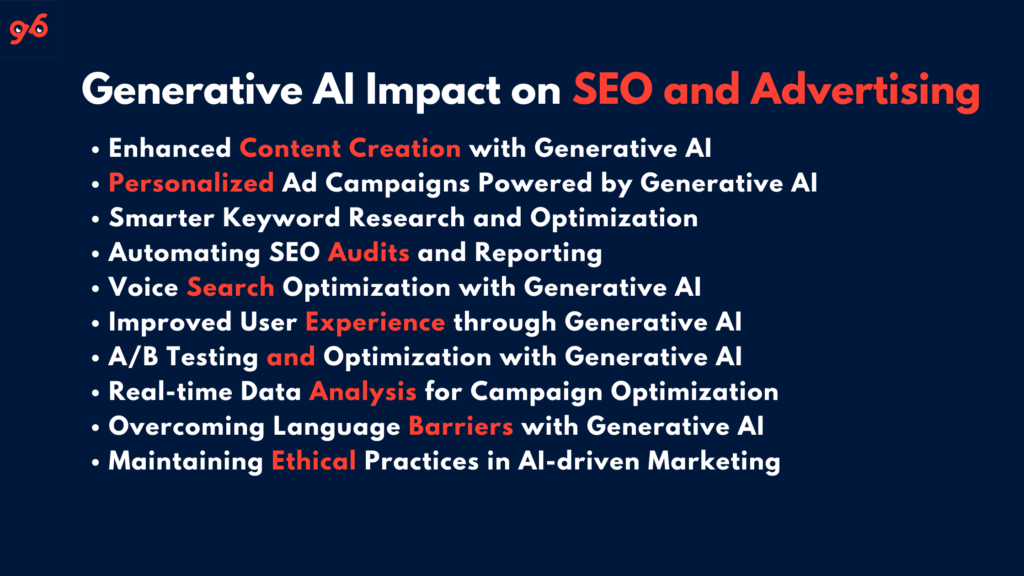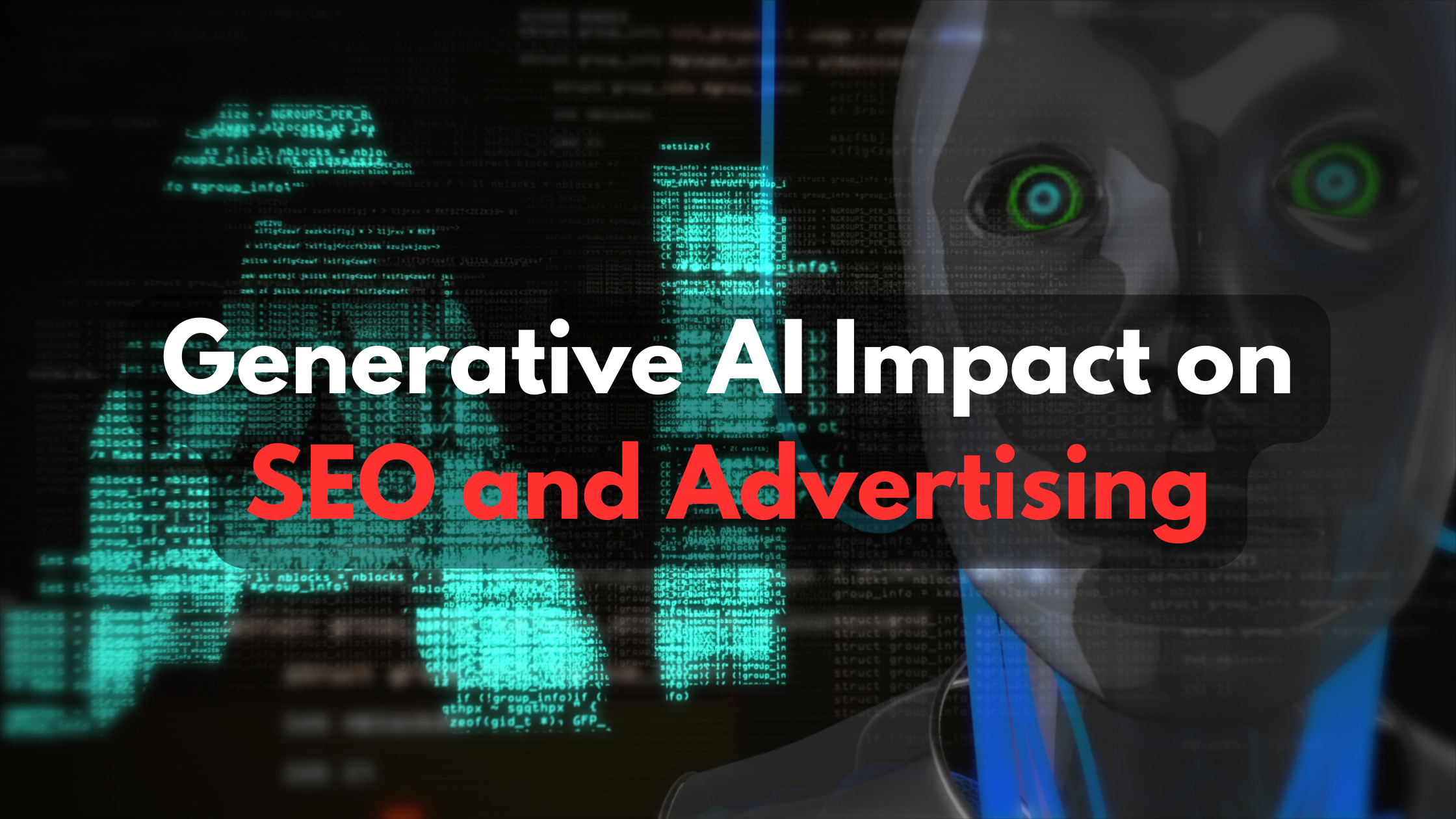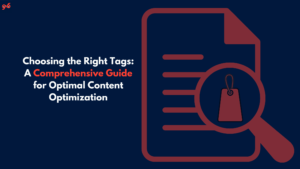In today’s digital era, the rapidly advancing field of artificial intelligence (AI) has brought forth innovative solutions to various industries. One such area that has seen a significant transformation is search engine optimization (SEO) and advertising. With the emergence of generative AI, businesses now have access to powerful tools to enhance their online presence and optimize their advertising campaigns. In this article, we will delve into the generative AI impact on SEO and advertising, exploring how it is reshaping digital marketing strategies and providing businesses with a competitive edge.
Generative AI Impact on SEO and Advertising

The integration of generative AI technologies has revolutionized the way businesses approach SEO and advertising. With its ability to analyze massive amounts of data and generate content, generative AI offers new avenues for optimizing websites and advertising campaigns. Let’s dive deeper into the various aspects where generative AI is making a significant impact.
1. Enhanced Content Creation with Generative AI
Generative AI algorithms have the remarkable ability to generate human-like content, making them a valuable tool for content creation in SEO and advertising. By leveraging this technology, businesses can save time and resources by automating the content generation process.
From blog posts and product descriptions to social media updates, generative AI can produce engaging and relevant content that resonates with the target audience. This not only helps in scaling content production but also maintains consistency across various marketing channels.
2. Personalized Ad Campaigns Powered by Generative AI
In the era of data-driven marketing, personalization is key to capturing the attention of potential customers. Generative AI plays a crucial role in enabling businesses to create highly personalized ad campaigns.
By analyzing user data and preferences, generative AI algorithms can generate tailored ads that are more likely to convert. This targeted approach helps businesses optimize their advertising budgets and improve overall campaign performance, leading to higher conversion rates and ROI.
3. Smarter Keyword Research and Optimization
Keywords are the backbone of SEO, and generative AI is transforming the way businesses conduct keyword research and optimization. With its advanced algorithms, generative AI can analyze vast amounts of data to identify relevant keywords and uncover hidden opportunities.
This helps businesses optimize their website content and meta tags to rank higher in search engine results pages (SERPs). By utilizing generative AI-powered keyword research tools, businesses can stay ahead of the competition and attract more organic traffic to their websites.
4. Automating SEO Audits and Reporting
Regular SEO audits are essential to identify areas for improvement and track the success of optimization efforts. Generative AI simplifies this process by automating SEO audits and reporting.
By analyzing website data and performance metrics, generative AI algorithms can provide comprehensive reports, highlighting areas that need attention and suggesting optimization strategies. This automation saves time and enables businesses to make data-driven decisions to improve their SEO performance effectively.
5. Voice Search Optimization with Generative AI
With the increasing popularity of voice-activated virtual assistants and smart speakers, optimizing for voice search has become crucial for businesses. Generative AI algorithms can analyze conversational patterns and semantic data to understand user intent better.
This enables businesses to optimize their website content for voice search queries, helping them appear in voice search results and reach a broader audience. By leveraging generative AI, businesses can gain a competitive edge in the voice search landscape.
6. Improved User Experience through Generative AI
User experience (UX) plays a vital role in ensuring the success of any website or online platform. Generative AI contributes to enhancing user experience by analyzing user behavior, preferences, and feedback. With this valuable information, businesses can make data-driven decisions to improve their website design, navigation, and overall user interface.
By leveraging generative AI, businesses can create personalized and seamless user experiences that keep visitors engaged and encourage them to stay longer on the website, reducing bounce rates and improving conversion rates.
7. A/B Testing and Optimization with Generative AI
A/B testing is a common practice in digital marketing to compare different versions of a webpage or advertisement to determine the most effective one. Generative AI can automate the A/B testing process, making it more efficient and accurate.
By utilizing generative AI algorithms, businesses can quickly test multiple variations and identify the optimal combination of elements that yield the best results. This data-driven approach helps businesses optimize their marketing efforts, drive higher engagement, and increase conversion rates.
8. Real-time Data Analysis for Campaign Optimization
Generative AI enables businesses to gather and analyze real-time data to optimize their advertising campaigns continuously. By leveraging AI-powered algorithms, businesses can monitor key metrics such as click-through rates, impressions, and conversions in real time.
This allows them to make data-driven decisions and adjust their campaign strategies on the go, ensuring maximum ROI and campaign effectiveness. Generative AI empowers businesses to stay agile and responsive in the dynamic digital advertising landscape.
9. Overcoming Language Barriers with Generative AI
In the global marketplace, language barriers can hinder businesses from reaching a wider audience. Generative AI technologies are breaking down these barriers by providing real-time language translation services.
Through natural language processing and machine learning algorithms, generative AI can accurately translate content into multiple languages, enabling businesses to expand their reach and engage with international audiences. This opens up new opportunities for businesses to tap into global markets and attract a diverse customer base.
10. Maintaining Ethical Practices in AI-driven Marketing
While the impact of generative AI on SEO and advertising is undeniably beneficial, it is crucial for businesses to maintain ethical practices in their AI-driven marketing strategies.
Transparency, privacy, and data security should be paramount considerations when utilizing generative AI technologies. Businesses must ensure that they comply with regulations and guidelines regarding user data privacy and consent.
By upholding ethical standards, businesses can build trust with their audience and establish a positive reputation in the AI-driven marketing landscape.
Conclusion
Generative AI has ushered in a new era for SEO and advertising, transforming digital marketing strategies and empowering businesses to stay ahead in the AI era. From content creation and personalized ad campaigns to keyword research and optimization, generative AI offers a wide range of benefits.
It automates processes, improves user experience, facilitates A/B testing, and enables real-time data analysis. However, it is important to approach the use of generative AI ethically and prioritize privacy and data security.
By harnessing the power of generative AI while maintaining ethical practices, businesses can optimize their SEO and advertising efforts, engage with their target audience, and drive success in the digital marketing landscape.
Generative AI enhances SEO and advertising by automating content creation, enabling personalized ad campaigns, improving keyword research and optimization, automating SEO audits and reporting, optimizing for voice search, improving user experience, facilitating A/B testing, enabling real-time data analysis, overcoming language barriers, and ensuring ethical practices in AI-driven marketing.
Generative AI is a powerful tool that can assist in content creation by generating human-like content. However, human creativity and expertise are still essential in shaping the strategy, providing unique insights, and maintaining brand identity.
Yes, generative AI can benefit businesses of all sizes. It offers scalable solutions that can be tailored to meet the specific needs and budgets of small startups as well as large enterprises.
Generative AI improves user experience by analyzing user behavior, preferences, and feedback to optimize website design, navigation, and overall user interface. It helps create personalized and seamless experiences that keep visitors engaged and increase conversion rates.
When using generative AI in marketing, it is crucial to maintain ethical practices. Businesses should prioritize transparency, privacy, and data security. Compliance with regulations and guidelines regarding user data privacy and consent is essential. By upholding ethical standards, businesses can build trust with their audience and establish a positive reputation in the AI-driven marketing landscape.
Generative AI can optimize advertising campaigns by analyzing real-time data, monitoring key metrics, and making data-driven decisions. It enables businesses to adjust their strategies on the go, ensuring maximum ROI and campaign effectiveness.



